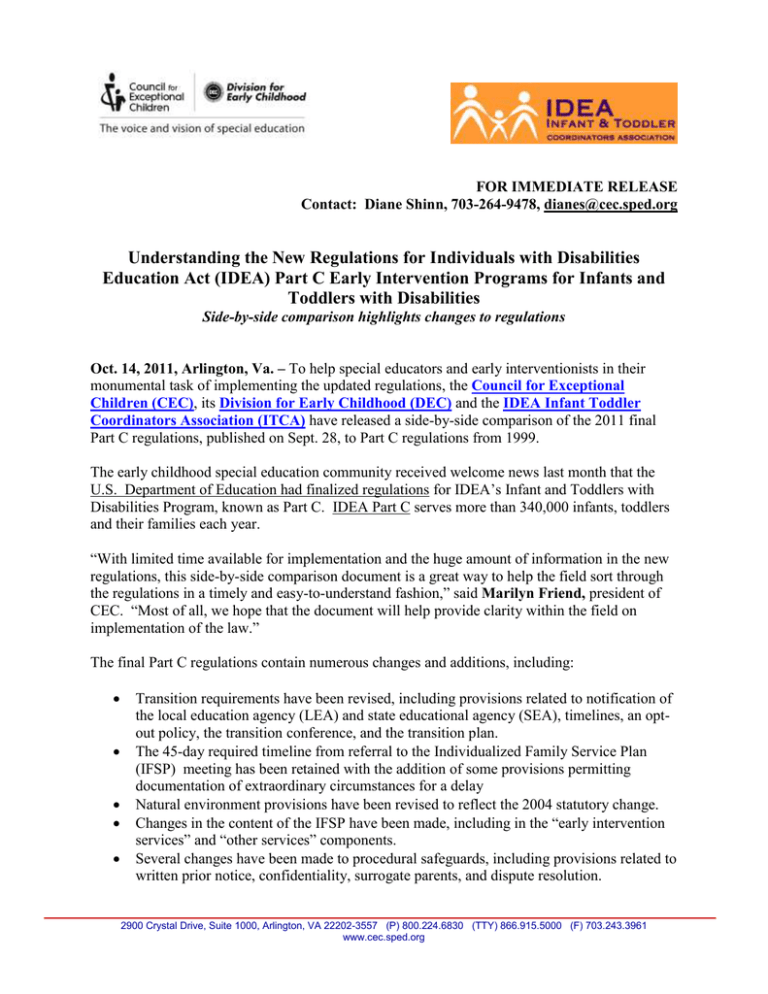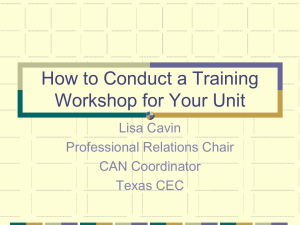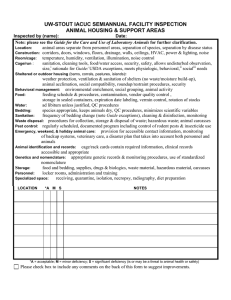Understanding the New Regulations for Individuals with Disabilities
advertisement

FOR IMMEDIATE RELEASE Contact: Diane Shinn, 703-264-9478, dianes@cec.sped.org Understanding the New Regulations for Individuals with Disabilities Education Act (IDEA) Part C Early Intervention Programs for Infants and Toddlers with Disabilities Side-by-side comparison highlights changes to regulations Oct. 14, 2011, Arlington, Va. – To help special educators and early interventionists in their monumental task of implementing the updated regulations, the Council for Exceptional Children (CEC), its Division for Early Childhood (DEC) and the IDEA Infant Toddler Coordinators Association (ITCA) have released a side-by-side comparison of the 2011 final Part C regulations, published on Sept. 28, to Part C regulations from 1999. The early childhood special education community received welcome news last month that the U.S. Department of Education had finalized regulations for IDEA’s Infant and Toddlers with Disabilities Program, known as Part C. IDEA Part C serves more than 340,000 infants, toddlers and their families each year. “With limited time available for implementation and the huge amount of information in the new regulations, this side-by-side comparison document is a great way to help the field sort through the regulations in a timely and easy-to-understand fashion,” said Marilyn Friend, president of CEC. “Most of all, we hope that the document will help provide clarity within the field on implementation of the law.” The final Part C regulations contain numerous changes and additions, including: Transition requirements have been revised, including provisions related to notification of the local education agency (LEA) and state educational agency (SEA), timelines, an optout policy, the transition conference, and the transition plan. The 45-day required timeline from referral to the Individualized Family Service Plan (IFSP) meeting has been retained with the addition of some provisions permitting documentation of extraordinary circumstances for a delay Natural environment provisions have been revised to reflect the 2004 statutory change. Changes in the content of the IFSP have been made, including in the “early intervention services” and “other services” components. Several changes have been made to procedural safeguards, including provisions related to written prior notice, confidentiality, surrogate parents, and dispute resolution. 2900 Crystal Drive, Suite 1000, Arlington, VA 22202-3557 (P) 800.224.6830 (TTY) 866.915.5000 (F) 703.243.3961 www.cec.sped.org Changes have been made in provisions related to financial responsibility, systems of payment and ability to pay as well as to the use of public benefits, insurance, and private insurance. Provisions related to monitoring, enforcement, reporting, and allocation have been included in a new subpart of the Part C regulations. The new regulations, which were promulgated under IDEA, complement IDEA 2004, the most recent reauthorization of IDEA. These final regulations are effective Oct. 28, 2011. The document will be available for downloading in its entirety or by subparts, which are: Subpart A: General Subpart B: State Application for Grant and Requirements for a Statewide System Subpart C: Procedures for Making Grants to States Subpart D: Program and Service Components of a Statewide System of Early Intervention Services Subpart E: Procedural Safeguards Subpart F: State Administration Subpart G: State Interagency Coordinating Council Subpart H: Monitoring and Enforcement, Reporting, and Allocation of Funds Both formats of the document are available on the Web sites of all three associations: www.cec.sped.org; www.dec-sped.org; and www.ideainfanttoddler.org. “Working together to complete the document within weeks of the publication of the new regulations demonstrates a strong collaborative partnership and commitment to providing timely, relevant materials to CEC members,” said Kristie Pretti-Frontczak, president of DEC. “We hope that the side-by-side will facilitate implementation of the new regulations and ensure quality early intervention services for young children with disabilities and their families.” Kim Wedel, president of ITCA, agrees. "During this time of fiscal and other challenges, state resources are strained,” she said, adding that “this collaborative product is an example of the efficiency of working together and the support offered for state programs for infants, toddlers, and their families." * * * * * * * * * * * * * For more information about CEC, visit www.cec.sped.org The Council for Exceptional Children (CEC) is an international community of professionals who are the voice and vision of special and gifted education. CEC’s mission is to improve, through excellence and advocacy, the education and quality of life for children and youth with exceptionalities and to enhance engagement of their families. The Division for Early Childhood (DEC) is an international membership organization for those who work with or on behalf of young children with disabilities and other special needs. The IDEA Infant and Toddler Coordinators Association (ITCA) is established to promote mutual assistance, cooperation, and exchange of information and ideas in the administration of Part C and to provide support to state and territory Part C coordinators. ###



